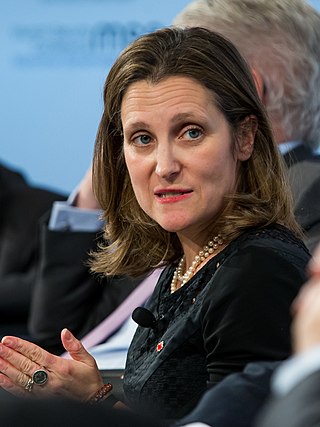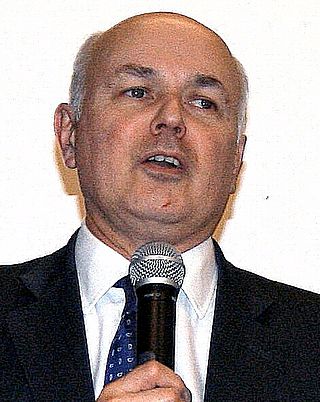
The House of Commons is the lower house of the Parliament of the United Kingdom. Like the upper house, the House of Lords, it meets in the Palace of Westminster in London, England. The House of Commons is an elected body consisting of 650 members known as members of Parliament (MPs). MPs are elected to represent constituencies by the first-past-the-post system and hold their seats until Parliament is dissolved.

The prime minister of the United Kingdom is the head of government of the United Kingdom. The prime minister advises the sovereign on the exercise of much of the royal prerogative, chairs the Cabinet and selects its ministers. As modern prime ministers hold office by virtue of their ability to command the confidence of the House of Commons, they sit as members of Parliament. The current prime minister is Rishi Sunak of the Conservative Party, who assumed the office on 25 October 2022.

The leader of the House of Commons is a minister of the Crown of the Government of the United Kingdom whose main role is organising government business in the House of Commons. The leader is always a member or attendee of the cabinet of the United Kingdom.

The Lord President of the Council is the presiding officer of the Privy Council of the United Kingdom and the fourth of the Great Officers of State, ranking below the Lord High Treasurer but above the Lord Keeper of the Privy Seal. The Lord President usually attends and is responsible for chairing the meetings of the Privy Council, presenting business for the approval of the Sovereign. In the modern era, the incumbent is by convention always a member of one of the houses of Parliament, and the office is normally a Cabinet position.

The Chancellor of the Duchy of Lancaster is a ministerial office in the Government of the United Kingdom. Excluding the prime minister, the chancellor is the highest ranking minister in the Cabinet Office, immediately after the Prime Minister, and senior to the Minister for the Cabinet Office. The role includes as part of its duties the administration of the estates and rents of the Duchy of Lancaster.
A sinecure is an office, carrying a salary or otherwise generating income, that requires or involves little or no responsibility, labour, or active service. The term originated in the medieval church, where it signified a post without any responsibility for the "cure [care] of souls", the regular liturgical and pastoral functions of a cleric, but came to be applied to any post, secular or ecclesiastical, that involved little or no actual work. Sinecures have historically provided a potent tool for governments or monarchs to distribute patronage, while recipients are able to store up titles and easy salaries.

The deputy prime minister of Canada is a minister of the Crown and a member of the Canadian Cabinet. The office is conferred at the discretion of the prime minister and does not have an associated departmental portfolio. Canadian deputy prime ministers are appointed to the Privy Council and styled as the Honourable, a privilege maintained for life.

The Cabinet Office is a department of the UK Government responsible for supporting the prime minister and Cabinet. It is composed of various units that support Cabinet committees and coordinate the delivery of government objectives via other departments. As of December 2021, it had over 10,200 staff, mostly civil servants, some of whom work in Whitehall. Staff working in the Prime Minister's Office are part of the Cabinet Office.

The leader of the House of Lords is a member of the Cabinet of the United Kingdom who is responsible for arranging government business in the House of Lords. The post is also the leader of the governing party in the House of Lords who acts as the government party chairperson in the house. The role is always held in combination with a formal Cabinet position, usually one of the sinecure offices of Lord President of the Council, Lord Keeper of the Privy Seal or Chancellor of the Duchy of Lancaster. Unless the Leader is also a departmental minister, being Leader constitutes the bulk of their government responsibilities, but it has never been an independent salaried office. The Office of the Leader of the House of Lords is a ministerial department.
A parliamentary secretary is a member of Parliament in the Westminster system who assists a more senior minister with their duties. In several countries, the position has been re-designated as assistant minister.
The Chief Whip is a political leader whose task is to enforce the whipping system, which aims to ensure that legislators who are members of a political party attend and vote on legislation as the party leadership prescribes.
The Cabinet of Australia, also known as the Federal Cabinet, is the chief decision-making body of the executive branch of the federal government of Australia. The cabinet is appointed by the prime minister of Australia and is composed of senior government ministers who head the executive departments and ministries of the federal government, this often includes assistant ministers and a number of special envoys and other government advisors. The cabinet is separate to the federal Department of the Prime Ministers and Cabinet.
A minister is a politician who heads a ministry, making and implementing decisions on policies in conjunction with the other ministers. In some jurisdictions the head of government is also a minister and is designated the ‘prime minister’, ‘premier’, ‘chief minister’, ‘chancellor’ or other title.

The UK Shadow Cabinet was appointed by Conservative Party leader Iain Duncan Smith. Following his initial appointments in September 2001 Smith managed three reshuffles before his resignation as leader in November 2003.

The National Government of August–October 1931, also known as the First National Government, was the first of a series of national governments formed during the Great Depression in the United Kingdom. It was formed by Ramsay MacDonald as Prime Minister of the United Kingdom following the collapse of the previous minority government, led by the Labour Party, known as the Second MacDonald ministry.

The Ministry of Justice (MoJ) is a ministerial department of His Majesty's Government, headed by the Secretary of State for Justice and Lord Chancellor. Its stated priorities are to reduce re-offending and protect the public, to provide access to justice, to increase confidence in the justice system, and to uphold people's civil liberties. The Secretary of State is the minister responsible to Parliament for the judiciary, the court system, prisons, and probation in England and Wales, with some additional UK-wide responsibilities, e.g., the UK Supreme Court and judicial appointments by the Crown. The department is also responsible for areas of constitutional policy not transferred in 2010 to the Deputy Prime Minister, human rights law, and information rights law across the UK.

His Majesty's Government is the central executive authority of the United Kingdom of Great Britain and Northern Ireland. The government is led by the prime minister who selects all the other ministers. The country has had a Conservative-led government since 2010, with successive prime ministers being the then-leader of the Conservative Party. The prime minister and their most senior ministers belong to the supreme decision-making committee, known as the Cabinet.

Ed Miliband became Leader of the Labour Party and Leader of the Opposition upon being elected to the former post on 25 September 2010. The election was triggered by Gordon Brown's resignation following the party's fall from power at the 2010 general election, which yielded a Conservative–Liberal Democrat Coalition. Miliband appointed his first Shadow Cabinet in October 2010, following the Labour Party Shadow Cabinet elections. These elections were the last such elections before they were abolished in 2011.

Tony Blair was Leader of the Labour Party and Leader of the Opposition from his election as Leader on 21 July 1994 until he became Prime Minister on 2 May 1997. Blair became leader upon the death of John Smith. Under Blair, the Labour Party was rebranded as New Labour to distance itself from previous Labour politics and the traditional idea of socialism. Despite opposition from Labour's left-wing, he abolished Clause IV, the party's formal commitment to the nationalisation of the economy, weakened trade union influence in the party, and committed to the free market and the European Union.














